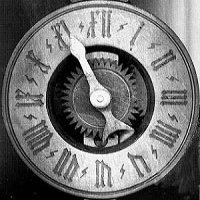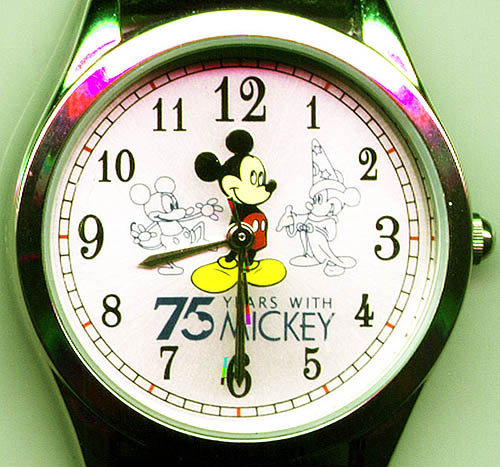Tempus Fidgets
by Rob Zaretsky
Today, our guest, historian Rob Zaretsky, takes on time. The University of Houston presents this series about the machines that make our civilization run, and the people whose ingenuity created them.
Mick Jagger was wrong: time is not on our side -- his, mine or yours. And it hasn't been, since the turn of the nineteenth century, even though an aging Mick continues to rock and roll.
As with so many items of the modern era, time was, if not invented, very much reinvented. Prior to the Industrial Age, our days were governed by natural cycles. Peasants worked the land according to the seasons and weather, while artisans hammered, spun and carved according to deeply held traditions. These customs were not based on rational and self-interested calculations -- the notorious bottom line -- but instead on a tacit social pact: one that guaranteed a certain moral economy placing the community over the individual and equity over competition.
 For Thomas Hardy, this older world required nothing more than a one-handed clock and, perhaps, this was still one hand too many! It was the age of cathedrals, where the tolling of bells was the sole man-made judge of time's passage. Work blended seamlessly with life: artisans chatted, drank, fought, sang and ate while they worked. They were responsible, from beginning to end, for the making of their goods. As a result, they were masters not just of their workplace, but of their time.
For Thomas Hardy, this older world required nothing more than a one-handed clock and, perhaps, this was still one hand too many! It was the age of cathedrals, where the tolling of bells was the sole man-made judge of time's passage. Work blended seamlessly with life: artisans chatted, drank, fought, sang and ate while they worked. They were responsible, from beginning to end, for the making of their goods. As a result, they were masters not just of their workplace, but of their time.
Before we reinvented time, we had much more of it. This paradox was observed by a delegation of French workers to the Chicago World's Fair in 1893. Touring American factories, where the laws of Ford and Taylor now ruled, the Frenchmen were shocked by what they didn't see: The card-playing, gossiping, and impromptu holidays occasioned by a glass of wine too many and other habits of a messy but rich life were forbidden here. For nineteenth century France, America already heralded a new world that denied the quality of both work and life.
Historians have long tried to quantify the eclipse of traditional rhythms by the time clock. We've learned that the stress associated with the time-regulation of production already appeared in the nineteenth century. George Steiner talks about the growing density of time. We became historical actors only in time to be hijacked by time. And E. P. Thompson notes that it's only with the advent of modern time that we are presented, upon retirement, with a gold watch -- a gift that celebrates servitude, not liberty.
Fittingly, academics have written nostalgically about this great shift: we are one of the few remaining pre-industrial professions. Our lives still revolve around the seasons -- fall and spring semesters. We post office hours obeyed only in the breach. Like punch drunk boxers still swinging after the bell has rung, we continue to drone, after the buzzer has sounded and students have left.
I'd go on, but all I have the time to say is that I'm Rob Zaretsky at the university of Houston where we're interested in the way inventive minds work.
P. Stearns, Lives of Labor: Work in Maturing Industrial Society. (Holmes and Meier, 1975)
G. Steiner, In Bluebeard's Castle. (Faber, 1971)
E. P. Thompson, The Making of the English Working Class. (Pantheon, 1964)
Robert Zaretsky is professor of French history in the University of Houston Honors College, and the Department of Modern and Classical Languages. (He is the author of Nîmes at War: Religion, Politics and Public Opinion in the Department of the Gard, 1938-1944. (Penn State 1995), Cock and Bull Stories: Folco de Baroncelli and the Invention of the Camargue. (Nebraska 2004), co-editor of France at War: Vichy and the Historians. (Berg 2001), translator of Tzevtan Todorov's Voices From the Gulag. (Penn State 2000) and Frail Happiness: An Essay on Rousseau. (Penn State 2001)
